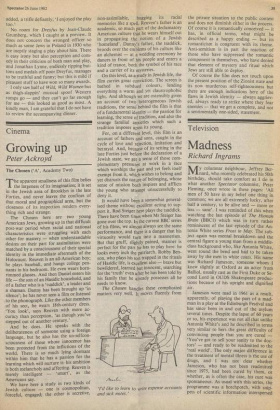Cinema
Growing up
Peter Ackroyd
The Chosen ('A', Academy Two)
The apparent smallness of this film belies the largeness of its imagination; it is set in the Jewish area of Brooklyn in the late Forties, and never leaves the confines of that moral and geographical area, but the closeness of its inspection renders every- thing rich and strange.
The Chosen here are two young American Jews, growing up in that difficult post-war period when racial and national characteristics were struggling with each other for mastery — when understandable desires on their part for assimilation were matched by a consciousness of their special identity in the immediate aftermath of the Holocaust. Reuven is an all-American boy; he plays baseball, and hangs college pen- nants in his bedroom. He even wears horn- rimmed glasses. And then Daniel enters his life — the son of an Hasidic household, and of a father who is a 'tsaddick', a leader and a shaman. Danny has been brought up 'in silence'; he has never seen a film or listened to the phonograph. Like the other members of his sect, he wears 18th-century dress. 'You look', says Reuven with more ac- curacy than perception, 'as though you've stepped out of another century.' And he does. He speaks with the deliberateness of someone using a foreign language, but he also has the un-selfcon- sciousness of those whose innocence has been protected from the inflictions of the world. There is so much lying dormant within him that he has a passion for the learning which will nurture it: his ambition is both melancholy and affecting. Reuven is merely intelligent — 'smart', as the Americans say. We have here a study in two kinds of Jewish culture — one is cosmopolitan, forceful, engaged; the other is secretive, non-assimilable, hugging its racial memories like a spell. Reuven's father is an academic, so much part of the declamatory American culture that he wears himself out in propagating the notion of a Jewish 'homeland'. Danny's father, the tsaddick, broods over the emblems of his culture like an alchemist — at a wedding ceremony he dances in front of his people and enters a kind of trance, both the symbol of his race and a carrier of its mysteries.
On this level, as a study in Jewish life, the film carries great conviction. The screen is bathed in subdued colours, lending everything a warm and yet claustrophobic light. And although we are ostensibly given an account of two heterogeneous Jewish traditions, the sense behind the film is that of a fundamental identity — the passion for learning, the sense of tradition, and also the strange familial anxieties which such a tradition imposes upon its young.
For, on a different level, this film is an account of fathers and sons, caught in the cycle of love and rejection, imitation and betrayal. And, because of its setting in the late Forties just before the declaration of a Jewish state, we get a sense of those com- plementary pressures at work in a race which worships the past and yet feels itself exempt from it, which wishes to belong and yet distrusts the nature of belonging, whose sense of mission both inspires and afflicts the young who attempt unsuccessfully to deny it. It would have been a somewhat general- ised theme without excellent acting to sup- port it. Rod Steiger here plays the tsaddick. There have been times when Mr Steiger has gone over the top. In the current BBC series of his films, we almost always see the same performance, and there is a danger that his virtuosity would turn into a mannerism. But that gruff, slightly pained, manner is perfect for the part he has to play here: he looks every inch the patriarch. Robby Ben- son, who plays his son trapped in the rituals of Hasidic life, is excellent also — brave but bewildered, learned but innocent, searching for the 'truth' even after he has been told by his family that he already possesses all he needs to know.
The Chosen handles these complicated matters very well. It moves fluently from
'I'd like to learn to write expense accounts and sick notes.'
the private situation to the public context and does not diminish either in the process. Of course it is romantically conceived — it has, in official terms, what might be described as a happy ending — but its romanticism is congruent with its theme. Anti-semitism is in part the reaction of those who have suppressed the romantic component in themselves, who have denied that element of mystery and ritual which Jews are still able to deploy.
Of course the film does not touch upon the present position of the Zionist state and its now murderous self-righteousness but there are enough indications here of the flaws in Jewish identity — always aggriev- ed, always ready to strike where they fear enemies — that we get a complete, and not a sentimentally one-sided, statement.






















































 Previous page
Previous page